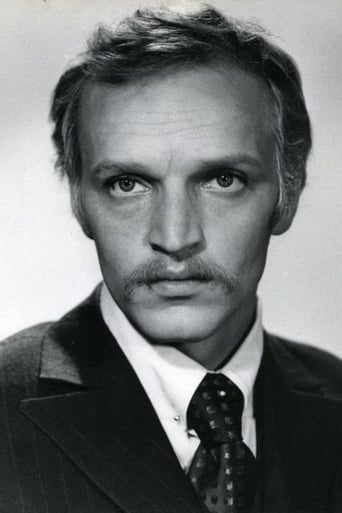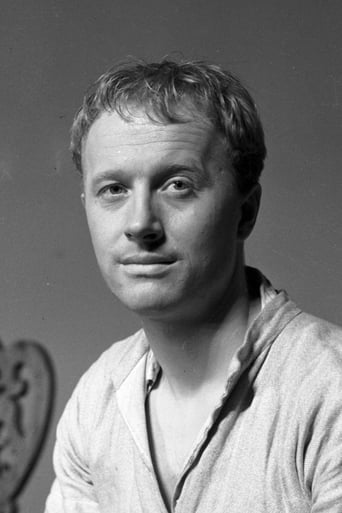Lovesusti
The Worst Film Ever
BootDigest
Such a frustrating disappointment
Steineded
How sad is this?
Dana
An old-fashioned movie made with new-fashioned finesse.
Anastasia Kharlamova
Stanislaw Lem is one of my favorite authors. Every book of his is both very deep and philosophical and so funny that I laugh to tears. And "The Inquest", the short story that the film's based upon, is one of his most wonderful pieces. So even though I'm not a fan of old sci-fi movies which usually seem boring and dull, I decided to watch this one.Luckily, it turned out to be an exception. The action was as swift and exciting as in modern films, and the plot was great. It was altered, of course - you can't turn a short story into a 1,5-hour film without expanding it. But the alterations fitted in perfectly. Most of Lem's hilarious humor remained in the movie, and some more was added (such as "Humans generally are less reliable. - Poor... poor humans").The acting was very good. I think Alexandr Kaidanovsky was the best - but perhaps that's because his part was the most difficult one. (I can't explain why, because I would spoil one of the main plot intrigues!) And Sergei Desnitsky made an excellent performance of the clumsy, awkward but brave pilot Pirx.To put it short: if you want first-class special effects and modern actors, skip it. If you want a both funny and thrilling sci-fi based on Lem's masterpiece, with various psychological and philosophical problems raised and discussed, "The Inquest of Pilot Pirx" is just for you.
jennyhor2004
A joint Polish-Estonian production, this low-budget movie about a space trip that nearly ends in tragedy examines the theme of how humans and human-like robots might co-exist if the robots, made to serve humans, realised they were superior to their masters in some ways. A corporation that manufactures intelligent androids is keen to begin mass production but meets resistance from the public and governments. It is proposed that a small crew of humans and androids be sent on a mission to place two probes in the rings of Saturn: a simple enough job but the purpose of the mission is to observe the behaviours and interactions between the humans and robots. Commander Pirx (Sergei Desnitski) is selected to head the mission. He refuses at first but changes his mind and accepts the role after narrowly escaping an assassination attempt. During the mission, some members of the crew including crew physician Tom Novak (Alexander Kaidanovski) confide in him and reveal their identities as either human or robot and insinuate that other members may not be human. Pirx isn't sure who's telling the truth and starts feeling a little paranoid about what's happening around him on the ship Goliath. Still he's determined to find out who is human and who is not, figuring that knowing who is which is critical to the mission's success. In the meantime a rogue member of the crew carries out small acts of sabotage on the ship and sends Pirx a recorded warning and threat which Pirx plays. When it's time to insert the probes, the Goliath goes wildly off course through the ring belt, the ship is forced to accelerate suddenly and the humans on board face death from being turned into schnitzels from the incredible G-forces the Goliath encounters.The special effects are uneven and often elementary to the extent of appearing cartoonish but they are adequate for the purposes of the film which gives the impression of being "hard science fiction" with its emphasis on scientific realism. There are just enough effects to make the society credible as scientifically and technologically advanced and at the same time a society we can recognise as ours. It's as if the movie takes place in an alternate 1970s where the spending priorities of governments and corporations were different enough that some areas of robotics and cybernetics developed faster than they did in our 197os, and so the parallel Earth got androids and we didn't. The world in "Test Pilota Pirxa" otherwise looks no different than what ours looked like over thirty years ago and the film itself now appears as a fictional historical drama.The acting is low-key and straight with Desnitski dominating the bulk of the movie's scenes. He underplays his role as do all the other actors in a film heavy with dialogue whose sole purpose is to push the plot and explore the human-versus-robot theme. As Novak who reveals his robot identity early on, Kaidanovski impresses in a minimalist, subdued way as a being who understands little of human nature and its ways yet is keen to help Desnitski. Interestingly his character and another robot voice their hope that Desnitski's opinion of robots will be negative so that their makers can't go ahead with mass production, otherwise the robots that already exist will lose their individual identities and won't be able to exult in their special abilities which help form those identities. No point in being an Übermensch if you have so many millions of clones like you who can do the same things you can do; you would just feel like … well, you would just feel like yet another machine-cog in a vast network of machine-cogs.The plot's resolution suggests that co-existence between humans and robots will always be ambivalent. Trying to second-guess what robots might be thinking and why they might do certain things and not others will be a major human preoccupation. As long as human and robot natures are kept separate with humans allowed to be irrational and robots restricted to acting logically and rationally, humans will always be able to control robots. Not a very satisfactory conclusion to reach; how human and robot natures will remain separate is never explained. The relationship between humans and technology already is a dynamic one in which technological advances and breakthroughs force us to change and re-evaluate our reliance and dependence on machines constantly so the same would be expected of human and android interactions.The film can be slow and doesn't really start until halfway through once the Goliath blasts off. The early half of "Test Pilota Pirxa" plays a little like a straight spy thriller. Once we're in space and Desnitski begins questioning the crew, the paranoia and the tension start to increase. The climax isn't especially dramatic and no, it doesn't actually come when the rogue member's identity is revealed and he meets a just punishment – it comes much later after Pirx's court case, in which he is prosecuted for having endangered his crew during the mission, ends."Test Pilota Pirxa" could have done better in its investigation of human-android interaction and whether humans and androids can live together amicably. It takes for granted that robots will always be logical and there will be large-scale human resistance towards them; this attitude wouldn't necessarily exist in real life. Much depends on what the robots are designed to do and how generalised and specialised we humans want them to be. At least the film treats its audiences as intelligent and able to consider its concepts. The ambiguous conclusion suggests a reluctance on the film-makers' part to commit to a definite opinion as to whether co-existence is possible and if so, can be successful; what could be implied instead is a plea for tolerance and a "live and let live" attitude.
denis888
I remember I saw this Polish - Russian film around 1978 or 1979, when I myself was 8 or 9 years old. That film really shocked me, and I was deadly frightened with the final scene where one of the "bad androids" was trying to launch some mechanism which would certainly kill all the humans of board of the space ship. And then, one of the human pilots managed to kick the velocity, and thus the artificial arms of that robot were vividly torn away. I was so frightened with that so I didn't sleep several hours at night. Let's be serious. This is a low-budget, old Soviet adaptation of Stanislaw Lem's sci-fi book. The problem is still actual now - will the handsome, smart, strong androids be better than real humans, or if they are, will they eliminate us as a defected rudimentary? The film is not a must for those who seek superb special effects, but this is a far warmer and sincere story about the old but actual question - Will robots replace us?
Shaytan
This film is based on the story with the same title, written by Polish science fiction writer - Stanislav Lem. Even though the movie not as good as story, it is better than average sci-fi movie.



